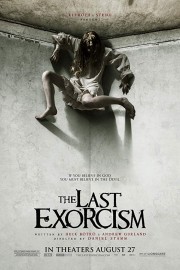The Last Exorcism
I guess it was only a matter of time before someone brought the whole “Blair Witch Project”/”Paranormal Activity” docudrama aesthetic to the exorcist genre. Who knew it would be “Hostel” director Eli Roth, serving as producer here?
Much less, who knew it would work out so well. Yeah, the ending is as bad as any horror film I’ve ever seen (including “Paranormal Activity”), but it is mighty compelling stuff to watch, thanks to a strong central idea- what if the exorcist didn’t believe in them?- and two strong performances by Patrick Fabian and Ashley Bell. It ain’t “The Exorcist” (or even “The Exorcism of Emily Rose”), but it isn’t something to sneeze at either when it comes to theatrical thrills.
Fabian stars as Southern evangelical minister Cotton Marcus, who’s been preaching the Gospel since he was a child, and has been performing exorcisms for nearly as wrong. Honestly, though, he begins to see the ritual less as a spiritual battle than as a spook story that comforts people who are dealing with psychological issues. But his own comfort is shaken when he is asked by a super-religious father (Louis Herthum) to come down and perform the ritual on his teenage daughter Nell (Bell), who shows signs of possession. But as he finds out, there’s more to this case than meets the eye, and he finds himself questioning his beliefs.
Fundamentally, writers Huck Botko & Andrew Gurland have a smart and intriguing spin on the genre William Friedkin built with his 1973 classic, and the docudrama style is executed very well by director Daniel Stamm, turning the story on its head by getting deep down into the minds of the characters while ramping up the horror. But the film loses some steam as it goes along- the fundamental story isn’t nearly as compelling as it has been in other, better films- and the ending? Well, let’s just say the big problem with horror docudramas is that the ending tends to be the same. A big reveal of hidden danger, followed by a camera still rolling even when the cameraperson isn’t able to stop it. At least “Cloverfield” found a way to subvert that formula a little bit.










